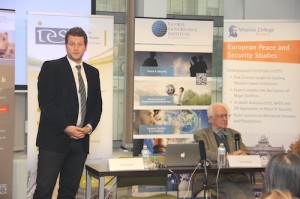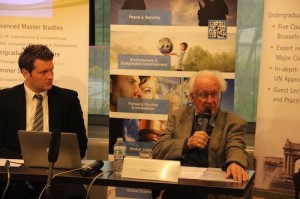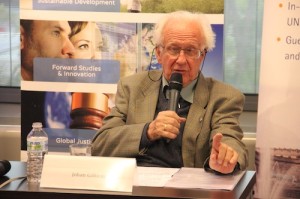Johan Galtung Lecture on ‘The European Foreign Policy of my Dreams’
TRANSCEND News, 14 Oct 2013
Global Governance Institute – TRANSCEND Media Service
On 7 October 2013 Johan Galtung, the founding scholar of Peace Studies, opened the European Peace & Security Studies-EPSS 2013 Lecture Series. The Distinguished Opening Lecture was titled “The European Union Foreign Policy of My Dreams”. In it Professor Galtung shared his method of conflict mediation.
Galtung defined conflicts as the incompatibility of goals. Resolving a conflict situation thus necessitates respect for each goal, but requires additionally overcoming the deadlock in changing the context of the conflict in order to find a reality in which both goals can be made compatible.
The example Professor Galtung used was his participation in the 1998 Peace Treaty between Ecuador and Peru, effectively ending a border-delineation-conflict through the creation of a national park in the disputed area. The Transcend method of mediation, developed by Galtung, requires individual dialogue between the mediation and the parties to understand their goals, fears and wishes to explore space for common ground. The next necessary step is to offer a creative solution that transforms the conflict.

Professor Joachim Koops, Director of GGI, welcomed Johan Galtung for the Distinguished Opening Lecture of the European Peace & Security Lecture Series.

Professor Johan Galtung, principal founder of the field of peace studies, gave his lecture on “The European Union Foreign Policy of my Dreams”.
Professor Galtung expressed his appreciation for the European project as this process of mediation and integration essentially created and continues to maintain the European Union and lasting peace in Europe. His dream of European Union foreign policy is to share and promote the European experience to establish strong regional organizations worldwide. His ‘dream’ includes complementing the United Nations with an Organisation of World Regions. After discussing the structural dimension of desired EU foreign policy, Galtung stressed the need for a dialogue across civilizations and religions.
In particular, he emphasized the lack of understanding between Christianity and Islam, which currently results in the mutual fear of holy war. Focusing on his method for mediation, Galtung advocated starting a religious dialogue based on appreciating each other’s values. Based on his experiences Muslims value the diversity in Christianity, while Christians would be well advised to learn from the closeness and sharing Islam expresses.
Subsequently, Galtung provided a historical context to the current difficulty for dialogue across religions and civilizations. This included a reminder of European history as a largely Christian region, its responsibility as colonial power and its relations with Islam, Russia and China. In this context, he stresses the aggressive behaviour of European nations toward Russia under Napoleon and Hitler. Similarly, the British and Portuguese colonial expansion to Macao and Hong Kong destroyed the civilizational bridge of the ‘Silk Road’.
Moving on to the Middle East conflict, Professor Galtung stressed the importance of the origin of the conflict to understand the incompatibility of goals. The repercussions are still experienced today in Lebanon and Syria previously under the French, as well as Palestine and Iraq previously under the British colonial rule.
Galtung then explored a viable solution to the Syria conflict, modeled on the approach of the Ottoman Empire: Governing Syria as one country with one parliament but complemented by a second chamber ensuring a veto and participation of each of the ancient nations. Only by ensuring each nation can maintain their identity, language and history will Syria return to peace. This demands a government by the Sunni majority but requires them to moderate their approach towards the minority nations. Currently, Syria consists of over a thousand different groups and rebel forces, many of them turning to extremism and some affiliated with al-Qaeda.
Professor Galtung ended the lecture by sharing that one of his principal ideas was to create a trans-European security cooperation in the 1960s. After years, his idea had spread far with diplomatic circles and the Organisation for Security and Cooperation in Europe was established. His key advice to participants was treat mediation as a medical science through diagnosis, prognosis, and therapy that is tailored to each conflict.
_____________________________
Levi Maxey, Intern at the Global Governance Institute.
Go to Original – globalgovernance.eu
DISCLAIMER: The statements, views and opinions expressed in pieces republished here are solely those of the authors and do not necessarily represent those of TMS. In accordance with title 17 U.S.C. section 107, this material is distributed without profit to those who have expressed a prior interest in receiving the included information for research and educational purposes. TMS has no affiliation whatsoever with the originator of this article nor is TMS endorsed or sponsored by the originator. “GO TO ORIGINAL” links are provided as a convenience to our readers and allow for verification of authenticity. However, as originating pages are often updated by their originating host sites, the versions posted may not match the versions our readers view when clicking the “GO TO ORIGINAL” links. This site contains copyrighted material the use of which has not always been specifically authorized by the copyright owner. We are making such material available in our efforts to advance understanding of environmental, political, human rights, economic, democracy, scientific, and social justice issues, etc. We believe this constitutes a ‘fair use’ of any such copyrighted material as provided for in section 107 of the US Copyright Law. In accordance with Title 17 U.S.C. Section 107, the material on this site is distributed without profit to those who have expressed a prior interest in receiving the included information for research and educational purposes. For more information go to: http://www.law.cornell.edu/uscode/17/107.shtml. If you wish to use copyrighted material from this site for purposes of your own that go beyond ‘fair use’, you must obtain permission from the copyright owner.
